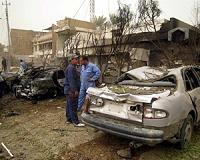 |
Baghdad (AFP) Nov 3, 2010 Discarded drinks cans and plastic bags litter the halls of al-Mamuniyeh state school in Baghdad where, despite over a billion dollars of US spending on Iraqi education, children squeeze into dim, crowded classrooms, often without books or electricity. In the same neighbourhood, the spotlessly clean al-Mawwada girls school that is privately-run and housed in a large modern villa seems a world away: teenagers with books sit behind neat desks in air-conditioned surroundings as a maths teacher chalks a quadratic equation on the blackboard. With security on the mend and violence ebbing as Iraq staggers to its feet following the 2003 US-led invasion that ousted Saddam Hussein, more schoolchildren have returned to classrooms, teachers and educators say. But that has overwhelmed the poorly-funded and long-neglected state schools, driving parents to one of the few dozen private schools like al-Mawwada that did not exist under Saddam but are now springing up in Baghdad and other parts of the war-torn country. "Private schools are better because they employ better teachers," said Adnan Hashim, headmaster of the state-run Omar Bin Abdulaziz secondary school in Baghdad. "I would prefer to send my own son to a private school than to educate him here," said Hashim, remarking that the annual fees of about two million dinars (1,600 dollars) for a final-year student were too expensive. Iraq once boasted an envious state education system, producing some of the most qualified doctors, engineers and scientists in the Middle East. All schools were state-owned and literacy was compulsory from an early age, as it is now, but one in five Iraqis under 15 still cannot read, according to the UN. "Overall, Iraqis' perceptions of education have deteriorated during the past few years," said a UN report in April. Education has been a prime target of insurgents fighting against American forces and the Iraqi government. Between 2003 and 2008, 31,598 violent attacks were reported against educational institutions, said a February 2010 UNESCO report quoting the Ministry of Education. "I have no problem paying the fees for a private education," said Fatima, a mother of three seeking admission for her 14-year-old at the Osool al-Deen school for boys. "I am paying for after-school private lessons anyway because the teaching is so bad at his public school. I am hoping that he won't need those lessons once he starts here," she said. "In the public schools you're on your own. There is no one to help if you don't understand something," said Riham Rashan, a tall and lanky ninth-grader at al-Mawwada. "The teaching is much better here." Private schools sometimes have facilities like swimming pools, or French-language or music lessons, not available in public schools. They also often have better teachers because they pay around double what their state-employed colleagues receive and because thousands of experienced teachers were forced out of their jobs at public schools after the US-led invasion for links to Saddam's Baath party. "Public schools in Baghdad are overcrowded because less than 30 have been built here since the invasion. We need 952 more," said Falah al-Qaisi, a senior education official in Baghdad's provincial council. He said that some schools had about 70 students per class, while private ones had no more than 25. Since 2003, the US government has spent more than one billion dollars on education in Iraq. The funding built over 500 schools and refurbished more than 2,500 others nationwide, according to USAID. There are about 3,000 public schools in Baghdad, while just 30 private ones have opened since they were authorised by the government in 2008. The popularity of private schools has meant that their numbers are growing. The UN says that the Iraqi government has "identified education as one of its main priorities" and increased budget allocation from 7.2 percent in 2008 to 9.9 percent in 2009. But Qaisi believes much more is needed -- between 18 and 20 percent of the budget -- and that the outdated curriculum should be modernised. He noted that the results from the private schools favoured by Iraqi parents were not actually much better. "Of the 61,000 students from public schools who took the exam last year for a high school diploma only 27 percent passed. But the percentage of students from private schools was only 31 percent -- not much different," Qaisi said, adding that the situation in Baghdad was worse than other parts of Iraq because of the capital's larger population. He said many who had stayed out of school for a year or two during the worst violence were having a hard time picking up their studies where they left off.
Share This Article With Planet Earth
Related Links Iraq: The first technology war of the 21st century
 Baghdad bombs kill 63
Baghdad bombs kill 63Baghdad (AFP) Nov 2, 2010 Eleven car bombs rocked Shiite neighbourhoods of Baghad on Tuesday killing at least 63 people amid growing concern that Sunni militants are taking advantage of a persistent power vacuum seven months after an inconclusive general election. Another 285 people were wounded in the bombings, which came just two days after Al-Qaeda gunmen stormed a church in the heart of the capital and took dozen ... read more |
|
| The content herein, unless otherwise known to be public domain, are Copyright 1995-2010 - SpaceDaily. AFP and UPI Wire Stories are copyright Agence France-Presse and United Press International. ESA Portal Reports are copyright European Space Agency. All NASA sourced material is public domain. Additional copyrights may apply in whole or part to other bona fide parties. Advertising does not imply endorsement,agreement or approval of any opinions, statements or information provided by SpaceDaily on any Web page published or hosted by SpaceDaily. Privacy Statement |